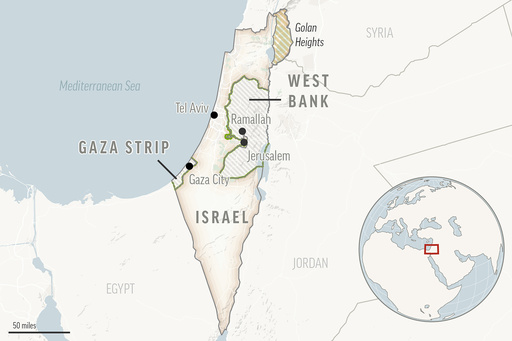DUBAI, United Arab Emirates (AP) — Yemen’s Houthi rebels launched attacks Thursday on both Israel and a ship traveling through the Gulf of Aden, setting the vessel ablaze and again demonstrating their ability to launch assaults despite facing U.S.-led airstrikes targeting their forces.
The rebels’ supreme leader, Abdul Malik al-Houthi, announced an “the escalation in sea operations” conducted by his forces as part of what they describe a pressure campaign to end Israel’s war on Hamas in the Gaza Strip. But the Houthis’ targets have grown more random since their attacks began in November, endangering a vital waterway for cargo and energy shipments traveling from Asia and the Middle East onward to Europe.
The attack Thursday in the Gulf of Aden saw two missiles fired at a Palau-flagged cargo ship named Islander, the U.S. military’s Central Command said. A European naval force in the region described the attack as sparking a fire and wounding one sailor on board the vessel, though the ship is continuing on its way.
The Islander had been coming from Thailand bound for Egypt and previously sent out messages saying “SYRIAN CREW ON BOARD” to potentially avoid being targeted by the Houthis. Other vessels similarly have sent messages identifying their crews as Muslims or not affiliated with Israel to try and avoid rebel attacks.
Meanwhile, sirens sounded early Thursday morning over the southern Israeli port of Eilat, followed by videos posted online of what appeared to be an interception in the sky overhead.
The Israeli military later said the interception was carried out by its Arrow missile defense system.
Israel did not identify what the fire was, nor where it came from. However, the Arrow system intercepts long-range ballistic missiles with a warhead designed to destroy targets while they are in space.
The system “successfully intercepted a launch which was identified in the area of the Red Sea and was en route to Israel,” the Israeli military said. “The target did not cross into Israeli territory and did not pose a threat to civilians.”
Eilat, on the Red Sea, is a key port city of Israel. On Oct. 31, Houthis first claimed a missile-and-drone barrage targeting the city. The rebels have claimed other attacks targeting Eilat, which have caused no damage in the city.
Houthi Brig. Gen. Yahya Saree claimed the attacks in a statement late Thursday night.
The Houthis “persist in upholding their religious, moral and humanitarian duties towards the Palestinian people and in defense of their beloved Yemen in the face of American-British aggression,” Saree said in a prerecorded statement. “Military operations will not stop unless the aggression stops and the siege on the Palestinian people in the Gaza Strip is lifted.”
Saree also claimed a drone attack on a U.S. warship in the region. Central Command said it and an allied warship shot down six Houthi drones in the Red Sea. France’s military claimed downing two of the Houthi drones.
Since November, the rebels have repeatedly targeted ships in the Red Sea and surrounding waters over the Israel-Hamas war. Those vessels have included at least one with cargo for Iran, the Houthis’ main benefactor, and an aid ship later bound for Houthi-controlled territory.
Despite a month of U.S.-led airstrikes, Houthi rebels remain capable of launching significant attacks. This week, they severely damaged a ship in a crucial strait and downed an American drone worth tens of millions of dollars. The Houthis insist their attacks will continue until Israel stops its combat operations in the Gaza Strip, which have enraged the wider Arab world and seen the Houthis gain international recognition.
Al-Houthi, the rebels’ leader, gave a televised speech in which he described an escalation in their attacks.
“Missiles, drones and military boats have been activated, and submarine weapons have been introduced into our operations at sea, which is worrying to the enemy,” he said. Central Command in recent days acknowledged destroying an underwater bomb-carrying Houthi drone.
Al-Houthi also denied his forces were allowing some vessels pass through the waterways by Yemen unharmed after paying protection money.
“The enemy failed in the face of our operations at sea,” he said. “He was not able to prevent them, nor was he able to deter them, nor was he able to limit or reduce them.”
The Houthis, a Zaydi Shiite group, seized Yemen’s capital in 2014 and have battled a Saudi-led coalition since 2015. Their Zaydi people ran a 1,000-year kingdom in Yemen up until 1962.
The U.S. State Department has criticized “the reckless and indiscriminate attacks on civilian cargo ships by the Houthis” that have delayed humanitarian aid including food and medicine bound for Ethiopia, Sudan and Yemen. That includes the Sea Champion, a ship carrying corn and other aid to both Aden and Hodeida that was recently targeted.
“Contrary to what the Houthis may attempt to claim, their attacks do nothing to help the Palestinians,” State Department spokesperson Matthew Miller said in a statement. “Their actions are not bringing a single morsel of assistance or food to the Palestinian people.”
This website uses cookies so that we can provide you with the best user experience possible. Cookie information is stored in your browser and performs functions such as recognising you when you return to our website and helping our team to understand which sections of the website you find most interesting and useful.
